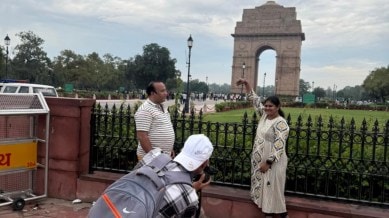📣 For more lifestyle news, click here to join our WhatsApp Channel and also follow us on Instagram
‘Kamaai khatam ho gayi hai’: India Gate’s once-iconic photographers fight to survive new rules
Your visit to India Gate once felt incomplete without a perfectly posed photograph in front of the monument. Today, those photographers are vanishing from sight.

Would you not agree with me if I said a picnic at India Gate is peak nostalgia? For many, the presence of photographers shaped these memories as families bonded over food, banter, and, most importantly, photographs. One click, and a moment was made.
Photographers from different parts of the country, who found a home in Delhi, would convince you not to leave without a souvenir. They choreographed your poses, turning even ordinary visits into something special. Back home, the hardbound album sealed the experience — proof that photographers were once essential to a day at India Gate.
Cut to 2025: printed photographs at India Gate are fading, much like the memories themselves. Amid the sea of smartphones and selfies, physical photographs are struggling to survive. Over the past few months, especially since mid-2025, new rules have barred photographers from entering the monument area with their cameras.
“Hum log ab andar nahi jaa sakte… Ye abhi hua hai kuch 5-6 mahine se. Ab private security hai, toh woh allow nahi karte. Personal camera lekar jaa sakte hein, par hum log allowed nahi hai” (We are not allowed inside anymore… This started about 5–6 months ago. There’s private security now, so they don’t allow us. Visitors can carry personal cameras, but we are not allowed), said Ramu Yadav, a photographer of almost six years.
When asked about the reason behind this change, another photographer said, “Ye Pahalgam ke baad se hua” (This happened after the Pahalgam terror attack.)
In June 2025, the Centre announced new regulations at India Gate, banning visitors from carrying food, bags, sheets, or pets, effectively ending the long-standing picnic tradition. However, the new rules do not explicitly ban photographers, though a restriction on video recording is reportedly under consideration.
No official ban, but no entry either
Despite no official order, photographers are still being turned away. “Humare camera mei kuch bhi galat nahi hai, toh hume allow karna chahiye. No vendor zone bola tha, par hum vendor nahi, bas photography karte hain” (There’s nothing wrong with our cameras, so we should be allowed. They called this a ‘no vendor zone,’ but we aren’t vendors, we just take photographs), one of them said.
They added, “Agar hamara camera allowed nahi hai, toh customers ka kyu allowed hai?” (If our cameras aren’t allowed, why are visitors’ cameras permitted?)
This was my first visit since the new rules came into effect. The tourist experience has changed dramatically. Following the Kartavya Path redevelopment project, the area is now divided into strict zones. Vendors are limited to designated areas near the parking zone, unlike before when gola sellers could be found right beside the monument.
“Pehle India Gate ke pass hi bechte the, ab vendors sirf Zone 1 mei allowed hei. Ab sarkar hume isse aagey nahi jaane deti” (Earlier we sold right near India Gate, now vendors are allowed only in Zone 1. The government doesn’t let us go beyond that), said Shabana, a third-generation sweet corn seller.
Earning about Rs 500–600 a day, she says her income has dropped. “Andar bahut acha kaam hota tha” (We used to earn well inside), she said.
‘Koshish jaari hai’ — The struggle continues
On my way to India Gate, near the underpass, I spotted several photographers waiting for clients. “Any success?” I asked. “Koshish jaari hai” (We’re still trying), one quipped.
Now, photographers can only be found near the entrance, taking pictures from afar. “Most visitors want digital copies now,” said Jitendra Yadav, who’s been in the profession for 15 years. “We charge Rs 20 for a soft copy and Rs 30 for a print, though hardly anyone wants prints anymore.”
For some, like Praveen Kumar, the restrictions haven’t hurt income too badly. “Ye patri ka kaam hai, isse meri daal roti chal rahi hai bas. Mere income mei zyada farak nahi pada” (This is small street work — it keeps my kitchen running. My income hasn’t changed much.)
But others disagree. “Kaam khatam ho gaya hai humara… Saara circle band ho gaya. Kamaai khatam ho gayi hai” (Our work is finished… The entire circle has shut down. The earnings are gone), said Yadav.
Daily earnings have dropped from Rs 500–600 to Rs 200–300. Many photographers have already quit.
Adapting to distance
To adapt, many upgraded their lenses from 18–55 mm to 70–300 mm to capture shots from outside the restricted area — an added expense. “Ab sabko naya lens lena pada, tabhi door se photo le sakte hain” (We all had to buy new lenses just to take photos from afar), they explained.
Their appeal is simple: “If visitors are allowed to carry cameras, why not us?”
They also allege that private photographers hired by VIPs or officials are still allowed inside. “In logon ko kyu allow karte hein? Tab security kuch nahi bolti” (Why are such people allowed? Then the security doesn’t say anything), they said.
Why photographers still matter
For many visitors, photographers remain part of the India Gate experience. “Now, their absence hits you,” said Anupama Vashist from Ludhiana. “Though we have our phones, those photos used to be keepsakes — they made the experience wholesome.”
Echoing her, Darshana from Assam said, “They are professionals. They know the right angles and lighting. It feels special to get clicked by them.”
As I moved closer to the monument, staring at its grandeur, a familiar voice floated through the crowd: “Ma’am, photo chahiye?” (Ma’am, would you like a photo?)
📣 For more lifestyle news, click here to join our WhatsApp Channel and also follow us on Instagram